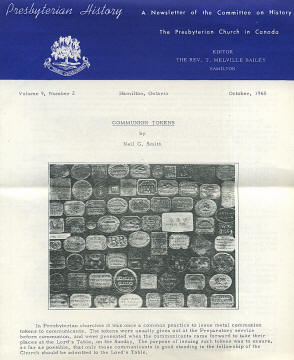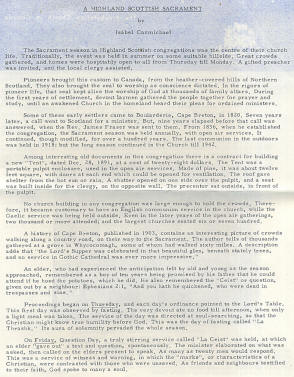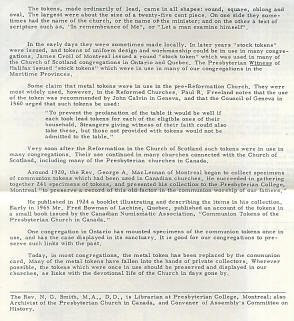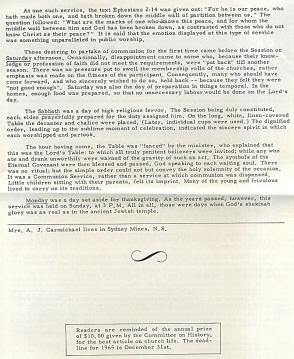|
Our thanks to The
Presbyterian Church in Canada for sending us this newsletter. It not
only explains what communion tokens are but also reveals some information
on the Highland Scottish Sacrament. Click on the pictures to get larger
readable copies.




How was Holy Communion observed in
these early years?
(Our thanks to
David Krueger for sending in this information)
Communion was observed once per year, and
was a five day event following this format:
-
Thursday was known
as "Fast Day", when little or no work was done in the congregation
-
Friday was
"Question Day", when a verse of scripture was presented for discussion
and explanation. The elders would express their opinion on questions
raised and would try to give guidance in the light of their own
Christian knowledge and experience.
-
Saturday was
"Preparation Day", when tokens were issued to communicant members.
Sometimes tokens were refused to members considered by the session to
have acted in a manner unbecoming a church member.
-
Sunday the
sacrament was dispensed
-
Monday a service
of thanksgiving would bring the five day solemn observance to an end.
In 1873, the days of
preparation were reduced to Friday only, with Communion on the following
Sunday. From the
current practice in the Free Church of Scotland (Continuing) which
reflects the largely unchanged practice of the Scottish Church from
perhaps the past 200 years we hear...
Communion in any given congregation normally
takes place twice in the year.
In the week leading up to it, different services are organized. On the
Thursday two services are held in most congregations (the cities may be
the exception) with the central themes of humiliation and the indwelling
of sin, requiring the ongoing need for repentance and prayer.
Many country churches traditionally held a question meeting on the Friday
-- largely restricted to the Gaelic areas nowadays (other congregations
will hold a further preparatory service with the theme being
self-examination) -- followed by a preparation service on Saturday.
Members receive a token during this time which is handed in when they
attend the celebration on the Sunday. The celebration is open to guests,
who have presented themselves to the Session beforehand, and who will be
allowed to partake upon a “credible” profession, where no contradiction
with regard to doctrine and practice is detected.
At the morning or noon service on the Sunday, after the fencing warning
from Gal. 5:19 – 23 and singing from Ps. 118 or another psalm, the
minister calls those who have been granted their token, imprinted with the
name of the congregation and “This do in remembrance of Me.”
The celebration takes place using a shared loaf of bread a common cup
containing real wine and is normally concluded with the singing of some
verses of Ps. 103. An evangelistic service with a message directed
towards those who were not at the Lord’s Table normally takes place on the
evening of that same Lord’s Day and A thanksgiving service follows on the
Monday after the celebration.
These services are not usually conducted by the local minister but by two
or more other ministers brought in to assist.
And thanks to Free Church of Scotland
(Continuing), Principal Clerk of Assembly and Press Officer: Rev. John
MacLeod, Portmahomack, TAIN, Ross-shire IV20 1YL for sending in the
above. |

